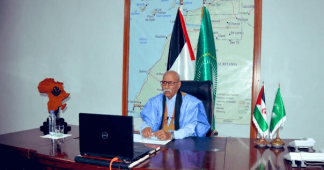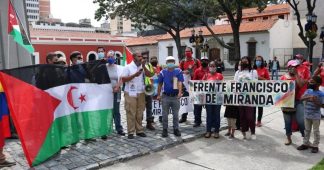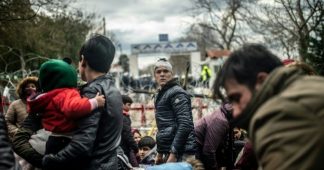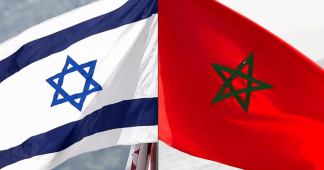By Rick Rozoff
The U.S. and NATO and African military allies are now planning this year’s iteration of the annual African Lion war games in Morocco and adjoining countries. The largest military exercise in Africa.
Military planners from U.S. Army Africa/Southern European Task Force were in the Moroccan city of Agadir from January 20-30 to plan the U.S.-led multinational exercise.
African Lion 21, to be held from June 7-18, however, will be occurring under ominous and unprecedented circumstances.
As a trade-off with Morocco for a deal normalizing relations with Israel engineered by the outgoing Donald Trump administration in December, the U.S. now for the first time recognizes Moroccan sovereignty over all of Western Sahara, territory it seized in 1975 (initially with Mauritania, which withdrew its claim in 1979) after colonial owner Spain left it. Washington presided as Mephistopheles in a Faustian pact with Morocco and Israel with the Western Sahara the sacrificial victim. The State Department, Central Intelligence Agency and the National Aeronautics and Space Administration (NASA) now list all of Western Sahara as part of Morocco.
Western Sahara has recently renewed its request for United Nations membership, and accuses France, Spain and the U.S. of thwarting that effort.
When Morocco and Mauritania divided up the former Spanish possession the Polisario Front (Frente Polisario) organized indigenous opposition to the seizure and waged a struggle for independence against Moroccan occupation.
The United Nations declared the Polisario Front the sole legitimate representative of the Sahrawi people, a position it still maintains. In 1984 the Organization of African Unity, the predecessor to today’s African Union, recognized the Polisario-formed Sahrawi Arab Democratic Republic as a member, occasioning Morocco to suspend its membership in the organization. Forty-six African nations (almost every country on the continent at the time) formally recognized the Sahrawi Arab Democratic Republic. Morocco remained the only African nation not to belong to the Organization of African Unity/African Union until it was readmitted in 2017. Until that year no other country in the world acknowledged Moroccan sovereignty over Western Sahara.
In January of this year Assistant Secretary of State for Near Eastern Affairs David Schenker, the highest-ranking State Department official in charge of the North Africa and Middle East bureau, traveled to the city of Laayoune in Western Sahara, which Morocco has designated as the capital of occupied Western Sahara, to set up a U.S. consulate there. The American embassy in Rabat hailed Schenker’s visit as “historic,” as indeed it is. Like Britain, France, Germany and Italy meeting in Munich in 1938 to cede Czechoslovakia’s Sudetenland to Germany was historic, and like the same four nations seventy years later, this time under European Union auspices, meeting to wrest Kosovo from Serbia in 2008. (That parallel appears to have escaped the notice of most everyone.)
The Sahrawi Arab Democratic Republic and the Polisario Front were likely caught off guard by December’s quid pro quo between Morocco and Israel and the subsequent U.S. recognition of Morocco’s sovereignty over their country. Tensions between the Moroccan government and Sahrawis flared up in November of last year, leading Reuters to title a report on the incident Fears grow of new Western Sahara war between Morocco and Polisario Front. The latter suspended its role in a 1991 ceasefire after Morocco sent troops to the UN-patrolled buffer zone in Western Sahara to reopen a road claimed by the Sahrawis.
The Polisario Front accused Moroccan military forces of having violated their nearly thirty-year truce and thus having “ignited war.”
Earlier this month the Polisario Front reported that the head of the Sahrawi National Guard, Addah al-Bendir, and other military leaders were killed by a Moroccan drone strike on their convoy. According to a Moroccan news sources, the convoy had been targeted in “joint mission by an unarmed (French-Israeli) Harfang drone,” then struck by a Moroccan fighter jet. As part of the new U.S.-engineered Moroccan-Israeli alliance, Rabat has purchased several Israeli, as well as American, drones lately.
This year’s Africa Lion exercise will be the first since the U.S. recognized the dispossession and subjugation of the Sahwari people and the conquest of their land, and the first since the resumption of hostilities between Morocco and the Sahrawi Arab Democratic Republic. As such it’s fraught with severe consequences.
Details of the impending war games are scant, but the Georgia Army National Guard, which is to provide 700 troops for them, confirms they will be centered in Morocco but also occur in neighboring Tunisia and in Senegal. Participants include 4,000 American service members and another 5,000 from Morocco, Senegal, Tunisia, Britain, Italy and the Netherlands.
Plans for last year’s African Lion – cancelled because of COVID-19 concerns – will provide some indication of what to expect.
The African Lion model in general is described by U.S. Africa Command (AFRICOM) as “as a joint, all-domain, multi-national exercise in Morocco, Tunisia, Senegal and Ghana linked to U.S. European Command’s DEFENDER series exercise to counter malign activity in North Africa and Southern Europe and increase interoperability between U.S., African, and international partners to defend the theater from adversary military aggression.”
That’s a mouthful, to be sure, but beneath layers of evasion and euphemism it’s evident the intent was to practice for military operations in Africa – for example, Western Sahara – and Europe. Regarding the latter, perhaps in the Balkans or the Caucasus.
Last year’s iteration was to have been conducted in Morocco, Tunisia, Senegal and Spain, Western Sahara’s former colonial master, and to have included 5,000 troops from the U.S., Morocco, Belgium, Britain, Canada, France, Germany, Italy, the Netherlands, Portugal, Spain, Egypt, Mauritania, Tunisia, Senegal and Australia.
The U.S., Belgium, Britain, Canada, France, Germany, Italy, the Netherlands, Portugal and Spain are NATO members. Indeed every nation in Africa was once colonized or otherwise dominated by countries that are now NATO members: Belgium, Britain, France, Germany, Italy, the Netherlands, Portugal, Spain and Turkey.
Morocco, Egypt, Mauritania and Tunisia are members of NATO’s Mediterranean Dialogue military partnership. Australia is a member of NATO’s Partners Across the Globe.
Again according to AFRICOM, “African Lion 20 was planned as a joint force headquarters-validating, partnership-strengthening, readiness-building, multinational, multi-domain and multi-functional exercise testing the warfighters’ ability to deploy, fight and win in a complex, competitive and global environment.”
Multinational military forces training to deploy, fight and win in a nation planning, with U.S. and NATO assistance, to extinguish the last spark of independence and resistance in Western Sahara.
NATO, since AFRICOM was nursed under the wing of U.S. European Command (whose top commander is also NATO’s Supreme Allied Commander Europe) and became an independent command in 2008, has been involved in the seven-month war against Libya in 2011 and in wars and and civil wars in Somalia and Sudan. After the destruction of Libya by AFRICOM and NATO, voices in the U.S., notably the New York Times, called for the deployment of NATO troops to Mali where the U.S. has been involved in a counterinsurgency war against ethnic Tuaregs (in a situation not dissimilar to that in the Western Sahara currently) since the beginning of the century.
The U.S. and its NATO allies may be preparing for their next African war.
Published at antibellum679354512.wordpress.com











